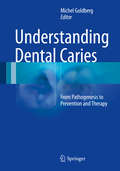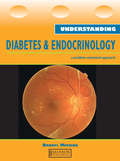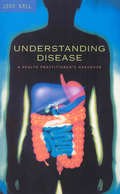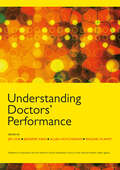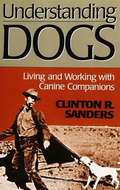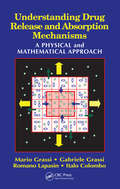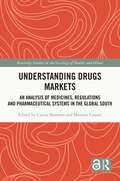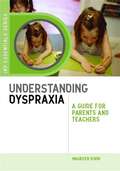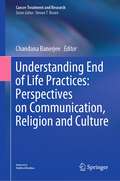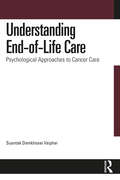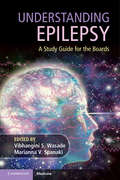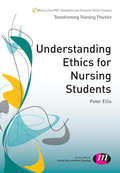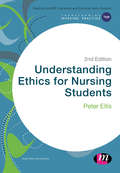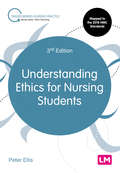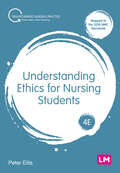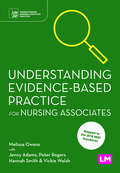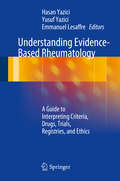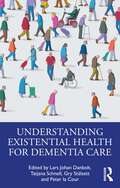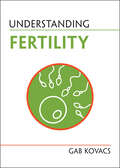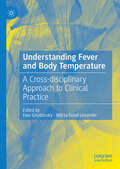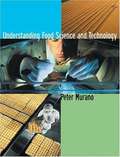- Table View
- List View
Understanding Dental Caries
by Michel GoldbergThis book thoroughly explains the biological background of dental caries and the formation of carious lesions, providing the reader with a sound basis for understanding the role and effectiveness of different therapeutic and preventive measures. Detailed information is presented on pathogenesis, ultrastructure, and diagnosis. All aspects of the carious process are covered, including development of the initial carious lesion limited to the enamel, evolution of the enamel carious lesion toward a dentin carious lesion, superficial and deep dentin lesions, and cervical erosions. Strategies for prevention and dental tissue regeneration are elaborated and both conventional therapies and minimally invasive and non-invasive treatment approaches are discussed. A separate section is devoted to dental fluorosis and the use of fluoridation and remineralisation agents. This scientifically focused and clinically relevant book, written by acknowledged experts in the field, will appeal to dentists seeking to extend their knowledge as well as to researchers, dental students, and other dental professionals.
Understanding Diabetes and Endocrinology
by Daryl MeekingDiabetes is a common and debilitating condition encountered by all doctors worldwide, regardless of specialist interest. This book aims to give the reader an understanding of the background, diagnosis, investigation and management of diabetes and endocrine disease. This book is set out in three main sections. The first gives a background understand
Understanding Disease: A Health Practitioner's Handbook
by Dr John BallThis book explains with a minimum of jargon how diseases start, what that main symptoms are and how they may affect us.It is intended as a concise guide for those working in alternative medicine and also for those without a medical background who want a clearer understanding of the ways in which common illnesses develop and the terms used to describe them.
Understanding Diseases in Skin of Color
by Inyang UkotBy equipping non-dermatologists and undergraduate medical students with the fundamentals presented in this book, the complications, chronicity, and worsening of dermatological conditions can be stemmed or avoided. Understanding Diseases in Skin of Color closes a critical gap, offering essential dermatologic insights in an accessible, high-yield format, and delivering the must-know essentials for both hospital-based and clinic-based dermatology practice. Covering conditions of the skin, hair, nails, mucous membranes, and selected dermatological conditions with systemic involvement, this book provides a concise yet comprehensive overview. The skin, one of the most visible parts of the human body, is subject to care, inadvertent abuse, and a plethora of diseases, making early diagnosis and treatment imperative. Starting with a chapter containing multiple illustrations on the basics of skin and its care, the contents cover commented case studies on selected conditions, and a part on how to deal with emergency and chronicity in dermatology. Medications, drug action, the most common investigations, and single best answer (SBA) MCQs accompanied with Answers and Notes are also included. This book also addresses the self-doubt that medical students and practicing non-dermatology doctors often face with confusing dermatological conditions. Through Understanding Diseases in Skin of Color, readers will gain confidence to handle daily outpatient practice competently while referring to more comprehensive textbooks for further knowledge. Designed to be a friendly, easy-to-carry hands-on book, it will be a valued resource for general practitioners, dermatology and family medicine residents, primary care physicians, and nursing personnel, by contributing to the management of dermatological conditions in dark skin effectively.
Understanding Doctors' Performance
by Jim Cox Allen Hutchinson Jenny King Pauline McAvoyUnderstanding Doctors’ Performance addresses possible reasons why doctors under-perform, covering specific areas such as education and training, physical and mental health, workload, personality, organisational culture, drug and alcohol misuse, and cognitive impairment. It draws together evidence and describes the factors (apart from clinical competence) that adversely affect performance and how they can be prevented, identified, assessed and addressed. This practical and easy to read book is invaluable for NHS managers, medical directors, chief executives and board members, along with directors of human resources in healthcare and healthcare professionals interested in the assessment of performance or the management of underperformance.
Understanding Dogs: Living and Working with Canine Companions
by Sanders Clinton R.Can people have authentic social relationships with speechless animals? What does your dog mean to you, your understanding of yourself, and your perceived and actual relationships with other s and the world? What do you mean to your dog? In Understanding Dogs, sociologist and faithful dog companion Clinton R. Sanders explores the day-to-day experiences of living and working with domestic dogs. Based on a decade of research in veterinary offices and hospitals, dog guide training schools, and obediences classes -- and colored with his personal experiences and observations at and outside home with his own canine companions -- Sanders's book examines how everyday dog owners come to know their animal companions as thinking, emotional, and responsive individuals. Linking animal companionship with social as well as personal identity, Understanding Dogs uses detailed ethnographic data in viewing human and animal efforts to understand, manipulate, care for, and interact with each other. From nineteenth-century disapproval of what was seen as irresponsibly indulgent pet ownership among the poor to Bill Clinton's caring and fun-loving image and populist connection to the "common person" as achieved through his labrador companion Buddy, Sanders looks at how dogs serve not only as social facilitators but also as adornments to social identity. He also reveals how, while we often strive to teach and shape our dogs' behavior, dogs often teach us to appreciate with more awareness a nourishing meal, physical warmth, a walk in the woods, and the simple joys of the immediate moment. Sanders devotes chapters to the specialized work of guide dog trainers; the problems and joys experienced by guide dog owners; the day-to-day work of veterinarians dealing with the healing, death, and euthanizing of their animal patients; and the everyday interactions, assumptions, and approaches of people who choose, for various reasons and in various ways, to spend their lives in the company of dogs. Understanding Dogs will interest those who live and work with animals as well as those studying the sociology of human-animal interactions.
Understanding Drug Release and Absorption Mechanisms: A Physical and Mathematical Approach
by Mario Grassi Gabriele Grassi Romano Lapasin Italo ColomboDemand for better reliability from drug delivery systems has caused designers and researchers to move away from trial-and-error approaches and toward model-based methods of product development. Developing such models requires cross-disciplinary physical, mathematical, and physiological knowledge. Combining these areas under a single cover, Under
Understanding Drugs Markets: An Analysis of Medicines, Regulations and Pharmaceutical Systems in the Global South
by Carine BaxerresDrawing on anthropology, historical sociology and social-epidemiology, this multidisciplinary book investigates how pharmaceuticals are produced, distributed, prescribed, (and) consumed, and regulated in order to construct a comprehensive understanding of the issues that drive (medicine) pharmaceutical markets in the Global South today. Based on primary research conducted in Benin and Ghana, and additional data collected in Cambodia and the Ivory Coast, this volume uses artemisinin-based combination therapies (ACTs) against malaria as a central case study. It highlights the influence of the countries colonial and post-colonial history on their models for state regulation, production, and distribution, explores the determining role transnational actors as well as industries from the North but also and increasingly from the South play in influencing local pharmaceutical markets and looks at the behaviour of health care professionals and individuals. Stepping back, the authors then unpick the pharmaceuticalization process and the multiple regulations at stake by looking at the workings of, and linkages between, (biomedical health) pharmaceutical systems, (representatives of companies) industries, actors in private distribution, and consumer practices. Providing a thorough comparative analysis of the advantages and disadvantages of different pharmaceutical systems, it is an important contribution to the literature on pharmaceutalization and the governance of medication. It is of interest to students, researchers and policy-makers interested in medical anthropology, the sociology of health and illness, global health, healthcare management and pharmacy.
Understanding Dyspraxia
by Maureen BoonThis fully-updated second edition of Helping Children with Dyspraxia has been revised to reflect current practice and developments, providing clear and positive answers to questions commonly asked by parents and teachers about dyspraxia. Maureen Boon draws on her considerable experience of working with children with movement disorders to identify the characteristics of dyspraxia, explaining assessment procedures and identifying what can be done to help. New reflections appear on concepts such as physical literacy and whether or not incidence of dyspraxia has increased, and in an overview of the characteristics and causes of the condition, a comprehensive update on how it is identified and assessed is provided. Terminology is reviewed, and the full range of therapeutic interventions that are available are outlined. New case studies and photographs are used to illustrate successful interventions in practice, and a helpful appendix with up-to-date details of useful publications, programmes, equipment and organisations is also included. Understanding Dyspraxia is a concise yet comprehensive handbook for parents and teachers. Its clear structure and practical, positive advice will make it an invaluable resource for anyone involved with a dyspraxic child.
Understanding End of Life Practices: Perspectives on Communication, Religion and Culture (Cancer Treatment and Research #187)
by Chandana BanerjeeThis book is an exploration of issues that are essential in end of life care. Understanding end of life practices across cultures and religions is important in the delivery of patient centered end of life care. This book helps clinicians and non-clinicians understand the various end of life practices in their vast patient populations, further contributing to providing empathetic and compassionate end of life care to patients. With the advent of many new options at the end of life, this book also explores the modern day approaches to end of life often sought by patients when faced with disease progression and adversity.
Understanding End-of-Life Care: Psychological Approaches to Cancer Care
by Suantak Demkhosei VaipheiThis book addresses the psychological, behavioural, emotional, and social issues that arise for cancer patients and their loved ones. It highlights how the existing stigma attached to cancer and associated mental illness constitutes major barriers to optimal psychosocial care of patients.This volume features scholarly entries designed to help clinicians review, anticipate, and respond to emotional issues that often arise in the context of treating cancer patients. Numerous cross-references and succinct tables and figures make it easy to use even for non-medical practitioners. It assists care providers in meeting challenges through the latest findings from wider Indian perspectives of psychological and social issues related to cancer. The relevance of psycho-oncology at different stages of disease (during treatment, rehabilitation, and palliative end-of-life care), along with various psycho-oncological intervention methods, are also illustrated.This book will be useful to students, researchers, and teachers from the fields of Oncology, Clinical Psychology, Medical Sciences, Sociology, Social Work, Psychiatry, Pathology, Bioethics, Palliative Care, Rehabilitation Medicine Anthropology, Biology, Law, and Religious Studies. It would also help in quality decision-making, pain symptom management, bereavement, and practical strategies in addressing psychological needs of cancer patients and their families, offered in an easy-to-use, quick reference format for general readers.
Understanding Epilepsy: A Study Guide for the Boards
by Vibhangini S. Wasade Marianna V. SpanakiWritten by experts in the field, this book offers an up-to-date and systematic approach to understanding epilepsy. It focuses on advanced tools and therapies in diagnosis and management, and comprehensively yet simply covers the content of the American Board of Psychiatry and Neurology certification. Five sections comprise the main text: mechanisms, classification, EEG technical concepts, diagnostic tools, and management. Pathophysiology and pathology of epilepsies are covered, as well as classification of seizures and epilepsies, electro-clinical syndromes, non-epileptic spells, and status epilepticus. Contributors also discuss diagnostic tools such as scalp and intracranial EEG, neuroimaging, and neuropsychological tests, in addition to the management of epilepsy and associated concerns, including anti-seizure drugs, surgical and stimulation therapies, gender issues, comorbidities, and psychosocial aspects. Tables, high-quality pathology, radiology and clinical images, and EEG illustrations aid readers in understanding content. A valuable book for medical trainees, neurologists, neurosurgeons, nurses and EEG technologists, and essential certification preparation.
Understanding Ethics for Nursing Students
by Peter EllisEthics is at the heart of nursing practice and an understanding of it and what it means for nursing is essential from early in the career of any nurse. However, ethical concepts can be hard to grasp for those new to the subject. This book explains ethical ideas in easy to understand terms and relates ethics to day-to-day nursing situations to help readers apply principles to their practice. The book also challenges readers to consider their own values and where ethics fits into who they are and how they behave. Key features include: - an introductory guide to ethics to help students and those new to the subject understand how it applies to nursing - the linking of each chapter to the latest NMC standards relating to ethical issues - case studies and scenarios that show how to resolve real ethical dilemmas - activities throughout to challenge readers to apply what they have learnt to their own practice.
Understanding Ethics for Nursing Students (Transforming Nursing Practice Series)
by Peter EllisFrom the start of their nursing programme it is essential that nursing students understand the significance of ethics and how it will impact the decisions they make on a daily basis. This book explains ethical ideas, theories and concepts in simple to understand terms and focuses on day-to-day nursing situations that apply principles to practice. The book challenges the reader to consider their own values and where ethics fits into who they are and how they behave and carefully unlocks this fascinating and important subject. Key features A practical guide that explores how ethics applies to nursing and where the key theories fit in Each chapter contains real world case studies and scenarios with an emphasis on ethical decision making Activities throughout challenge the reader to reflect on their views and experiences and apply what they have learnt to their own practice Each chapter is linked to the latest NMC standards relating to ethical issues.
Understanding Ethics for Nursing Students (Transforming Nursing Practice Series)
by Peter EllisEthics have an significant impact on the decisions nurses make in their day-to-day work, so it&’s important for all student nurses to develop their understanding of ethical frameworks as preparation for future practice. In this book, the author explains ethical ideas, theories and concepts in simple to understand terms, focussing on real-life nursing situations in order to make applying these principles to practice easy. This book will make student nurses consider their own values, and how ethics fit into who they are and how they behave, helping them to unlock this interesting and complex subject. Key features: · Fully mapped to the new NMC standards of proficiency for registered nurses (2018) · A practical guide that explores how ethics applies to nursing and where theory fits in · Contains real work case studies with an emphasis on ethical decision making · Activities challenge students to reflect on their own values, experiences and prejudices and think about how ethics fits in with who they are and how they behave
Understanding Ethics for Nursing Students (Transforming Nursing Practice Series)
by Peter EllisEthics have an significant impact on the decisions nurses make in their day-to-day work, so it&’s important for all student nurses to develop their understanding of ethical frameworks as preparation for future practice. In this book, the author explains ethical ideas, theories and concepts in simple to understand terms, focussing on real-life nursing situations in order to make applying these principles to practice easy. This book will make student nurses consider their own values, and how ethics fit into who they are and how they behave, helping them to unlock this interesting and complex subject. Key features: · Fully mapped to the new NMC standards of proficiency for registered nurses (2018) · A practical guide that explores how ethics applies to nursing and where theory fits in · Contains real work case studies with an emphasis on ethical decision making · Activities challenge students to reflect on their own values, experiences and prejudices and think about how ethics fits in with who they are and how they behave
Understanding Ethics for Nursing Students (Transforming Nursing Practice Series)
by Peter EllisEthics have an significant impact on the decisions nurses make in their day-to-day work, so it’s important for all student nurses to develop their understanding of ethical frameworks as preparation for future practice. In this book, the author explains ethical ideas, theories and concepts in simple to understand terms, focussing on real-life nursing situations in order to make applying these principles to practice easy. This book will make student nurses consider their own values, and how ethics fit into who they are and how they behave, helping them to unlock this interesting and complex subject. Key features: Fully mapped to the NMC Future Nurse standards of proficiency (2018) A practical guide that explores how ethics applies to nursing and shows you how the theory fits in to the realities of practice Contains real work case studies with an emphasis on ethical decision making Activities challenge students to reflect on their own values, experiences and prejudices and to think about how ethics fits in with who they are and how they behave
Understanding Ethics for Nursing Students (Transforming Nursing Practice Series)
by Peter EllisEthics have an significant impact on the decisions nurses make in their day-to-day work, so it’s important for all student nurses to develop their understanding of ethical frameworks as preparation for future practice. In this book, the author explains ethical ideas, theories and concepts in simple to understand terms, focussing on real-life nursing situations in order to make applying these principles to practice easy. This book will make student nurses consider their own values, and how ethics fit into who they are and how they behave, helping them to unlock this interesting and complex subject. Key features: Fully mapped to the NMC Future Nurse standards of proficiency (2018) A practical guide that explores how ethics applies to nursing and shows you how the theory fits in to the realities of practice Contains real work case studies with an emphasis on ethical decision making Activities challenge students to reflect on their own values, experiences and prejudices and to think about how ethics fits in with who they are and how they behave
Understanding Evidence-Based Practice for Nursing Associates (Understanding Nursing Associate Practice)
by Jenny Adams Hannah Smith Peter Rogers Melissa Owens Vickie WelshProviding evidence-based care is fundamental to working safely and effectively as a nursing associate. This book equips you with the skills to identify, evaluate and apply evidence and research to your practice. From day-to-day procedures and decision-making, to addressing health inequalities and implementing service improvement, it develops your confidence in using evidence to underpin all aspects of your role. Key features - Fully mapped to the NMC Standards of Proficiency for Nursing Associates (2018) - Explains the principles of evidence-based practice in clear, straightforward language - Case studies and activities illustrate evidence-based practice across a range of different patient groups and care settings - Written specifically to address the unique experiences, challenges and requirements of the nursing associate role
Understanding Evidence-Based Practice for Nursing Associates (Understanding Nursing Associate Practice)
by Jenny Adams Hannah Smith Peter Rogers Melissa Owens Vickie WelshProviding evidence-based care is fundamental to working safely and effectively as a nursing associate. This book equips you with the skills to identify, evaluate and apply evidence and research to your practice. From day-to-day procedures and decision-making, to addressing health inequalities and implementing service improvement, it develops your confidence in using evidence to underpin all aspects of your role. Key features - Fully mapped to the NMC Standards of Proficiency for Nursing Associates (2018) - Explains the principles of evidence-based practice in clear, straightforward language - Case studies and activities illustrate evidence-based practice across a range of different patient groups and care settings - Written specifically to address the unique experiences, challenges and requirements of the nursing associate role
Understanding Evidence-Based Rheumatology
by Emmanuel Lesaffre Hasan Yazici Yusuf YaziciIt is imperative that health professionals caring for patients with rheumatic diseases understand how to correctly interpret evidence in their field, taking into account the merits and shortcomings of available data. Understanding Evidence-Based Rheumatology offers a practical assessment of criteria, drugs, trials, and registries and provides useful tools for successfully interpreting this data. The book introduces readers to basic analysis of trial design, statistics and application of data through no-nonsense, easy-to-follow insights. Using numerous examples, chapters outline the difficulties physicians encounter when measuring disease activity in rheumatology and offer strategies for systematically approaching these situations. Ethical issues in study design and reporting are examined and the book closes with a summary of future directions for scientific and clinical studies in rheumatology. Understanding Evidence-Based Rheumatology is an invaluable resource for trainees, clinicians and scientists, preparing them with the necessary tools to correctly gather evidence and shed light on the difficult practice of rheumatology.
Understanding Existential Health for Dementia Care
by Tatjana Schnell Lars Johan Danbolt Gry Stålsett Peter La CourUnderstanding Existential Health for Dementia Care is a groundbreaking book that describes how existential health can enrich and expand bio-psycho-social approaches to dementia care, recognizing that well-being extends beyond physical, neurological, and cognitive symptoms. This book equips professionals, clinicians, and caregivers to integrate existential dimensions into person-centered care, emphasizing the role of meaning in life and emotional connection for dealing with illness and suffering.Beginning with an introduction to the concept of existential health, the book connects this to an overall understanding of health related to dementia care. Core themes include the coincidence of suffering and meaning, fear of dementia, challenges to personhood, and multicultural perspectives. The book then provides an overview of how existential health can enhance person-centered care, addressing different types of dementia, neurological changes, emotional factors, and daily life functioning.The final section provides examples of existential support, including tools for meaningful conversations and existential exploration. The last chapter weaves together the book’s thematic threads, highlighting how past experiences contribute to present sense of meaning, identity, and connectedness in people with dementia.It is valuable reading for professionals in dementia care—nurses, psychologists, doctors, and chaplains—as well as for caregivers seeking inspiration and students in medicine, nursing, psychology, theology, and social work.
Understanding Fertility (Understanding Life)
by Gab KovacsInfertility can have devastating physical, emotional and financial effects on people affected. It is a common problem, but can be hard to talk about, and hard to understand. In this concise book, Dr Kovacs, a reproductive gynaecologist who has spent the past 40 years working with patients facing fertility problems, focuses on and unpicks key misconceptions. In his clear explanations, he covers the basic physiology of conceiving, and describes the areas that have to be explored for those who have not yet been able to conceive. Specific chapters cover the three major problem areas: lack of releasing eggs, sperm problems, and abnormalities of the female passages. Treatment options are discussed for each of these areas, including technical details and a brief readable overview of their history. The many ways of parenting which are now available are also detailed. This is a recommended read for couples wanting to conceive, their friends and families, and anyone who wants to understand fertility.
Understanding Fever and Body Temperature: A Cross-disciplinary Approach to Clinical Practice
by Ewa Grodzinsky Märta Sund LevanderThis book covers several areas, such as immunology, infectious diseases, physiology, general nursing, and medicine as well as measurement accuracy and the history of our understanding of fever. This book employs an interdisciplinary approach to exploring our concept of body temperature and specifically fever. The present volume revolves around thermometry, taking the reader on a journey from the past to the present. Yet while the emphasis is on the clinical importance of obtaining accurate, quantitative measurements of body temperature, the reader is also introduced to the most recent clinical work on the subject. This book represents a truly cross-disciplinary collaboration, using evidence-based practice to integrate physiological and immunological knowledge. The authors’ intention with this volume is to help readers gain better insight into the importance of using knowledge from different disciplines to develop an appreciation of the different aspects of body temperature. In addition, the reader will come to understand the concept of fever in a broader perspective than is traditionally adopted.
Understanding Food Science and Technology
by Peter MuranoUNDERSTANDING FOOD SCIENCE AND TECHNOLOGY is a comprehensive introductory level text that provides thorough up-to-date coverage of a broad range of topics in food science and technology. The text begins with an explanation of the interdisciplinary nature of food science (including biology, engineering, chemistry, and physics) and describes avenues of advanced study in the field. The text explores key food commodities and food composition with an emphasis on the functional properties of each commodity. <p><p> Three chapters on food chemistry cover the chemical and physical properties of foods through the use of many easy to understand figures, tables, and illustrated concepts. Next the text includes an overview of food law that provides historical perspective as well as the latest information on nutrition labeling and food regulation. Thorough coverage of processing methods in included in all major food commodities as well as a background in microbiology and fermentation, food handling and safety, food contamination, HACCP principles and toxicology. The final chapters cover food engineering concepts and applications, biotechnology and the field of sensory evaluation and food product development with coverage of marketing principles.
